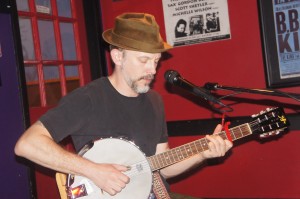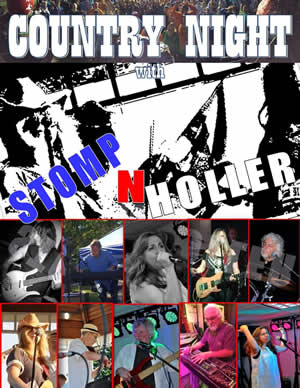 Jeremy Lyons played a solo acoustic gig at Smoken’ Joe’s in Brighton last Sunday night, and the blues man treated an appreciative audience to a hot batch of vintage Americana roots music.
Jeremy Lyons played a solo acoustic gig at Smoken’ Joe’s in Brighton last Sunday night, and the blues man treated an appreciative audience to a hot batch of vintage Americana roots music.
Lyons’s deliciously greasy blues notes were sliding all over his frets with a tasteful application of the earthy, rootsie styles of the Mississippi Delta. Picking with all five fingers gave the presence of multiple guitars from his one resonator guitar and from his banjo. His voice had a warm, gravelly timbre, and he used it mostly in understated deliveries of his songs, making each tune slide on by with an unobtrusive grace.
He played everything either on his National resonator guitar or a his six string banjo. If you’re getting the idea that he captured the essence of that old timey vintage roots sound, then you’re getting a clear picture. Lyons wrung all the joy and pain possible out of each note. He had a way of conjuring up a low end tone that anchored and gave weight to every melodic line he played.
Lyons kept his presentation light and accessible for the dinner crowd that nearly packed the place. Everyone there was receptive to the blues music that accompanied their meals. It was certainly a peaceful, easeful vibe in the room. Still, the musician did keep his music interesting and engaging. At one point, Lyons had his notes skipping around, jumping, cascading in quick intervals in a way that made you picture a river carrying a raft easily down its currents.
Lyons’s solo acoustic take on “Stormy Monday” was loaded with expressive blues licks filled with the reminisces of music made after the turn of the last century. You could almost see the struggling southern cotton pickers sitting on a front porch singing along to the local guitarist. Here, Lyons’s vocal approach was in line with the deep, soulful, full-throated style of a man with a lot going on inside and a need to get it all off his chest, and Lyons belted it out accordingly.
Lyons picked off the aggressive notes and low end run of “I Can’t Be Satisfied” with fantastic timing. You could close your eyes and picture yourself sitting in a 1920s juke joint. The juicy intricacies of the bridge had the sudden frequent urgency of several firecrackers going off at once.
Lyons played a few tunes by Mississippi John Hurt on his six string banjo. His quick paced banjo notes created a tapestry of melody, low end, and voice. Lyons offered other select choices. He played a hymn called “Sweet Bye Bye” that was plump with spiritual earnestness. His take on ragtime on “Crazy About You” featured the jaunty old fashioned melody traveling merrily down a gravel road, with Lyons’s chirpy vocal approach making you feel you were being greeted by a neighbor who is coming over to sit and talk with you for a spell on your front porch.
Lyons likes to play songs by Mississippi John Hurt, offering plenty of them. His snappy notes and doubled sweet melodies created a special resonance over his thicker low end notes. Often times, Lyons’s voice got sharper, making the tones more serious and somber, perfectly fitting that emotional torture that could often lead to violence, death, and destruction. Lyons kept a mournful undercurrent roaming below the lyrical narratives.
A self-described “lazy writer,” Lyons said he has little time to write. This lead him into his original whimsical tune “Long Lunch,” a humorous ditty about all kinds of daily tensions that can be relieved by a long lunch break.
Lyons brought out even more of his musical caliber during his second set at Smoken’ Joe’s. He sustained sweet notes that echoed with special qualities and contrasted nicely with his slightly graveled voice. Sharp rhythms and higher twangy notes supported each other and made the acoustic instruments sound fulsome and detailed. At times he imitated a train whistle by squeezing out two notes in split second intervals.
You could feel it when Lyons got deep into his down and dirty Delta. He dug out the pain in Muddy Waters’ “You’re Gonna Need My Help.” Another highlight was the racing tempo and heartfelt delivery of Skip James’s of “I’m so Glad” a tune known to a second generation who grew up with Cream’s interpretation.
The remainder of Lyon’s set consisted of more blues and some tunes by Johnny Cash, Hank Williams, and Jimmy Rogers. But it was his rendition of “Salty Dog,” whose racing notes made you think of Dukes Of Hazzard and Smokey And The Bandit, that actually got a woman named Marybeth from Virginia doing a Hee Haw version of the Jitterbug.
Lyons has a special gift of being able to entertain with levity while being serious in his respectful deliveries of the time honored songs that make up his set lists.

